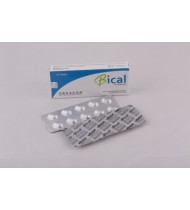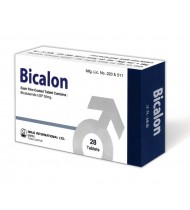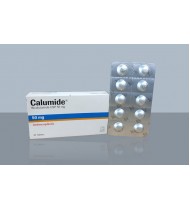Bicalutamide
Indications
Bicalutamide 50 mg daily is indicated for use in combination therapy with a luteinizing hormone-releasing hormone (LHRH) analog for the treatment of Stage D2 metastatic carcinoma of the prostate.
Bicalutamide 150 mg daily is not approved for use alone or with other treatments
Bicalutamide 150 mg daily is not approved for use alone or with other treatments
Pharmacology
Bicalutamide is a non-steroidal androgen receptor inhibitor. It competitively inhibits the action of androgens by binding to cytosol androgen receptors in the target tissue. Prostatic carcinoma is known to be androgen sensitive and responds to treatment that counteracts the effect of androgen and/or removes the source of androgen.
When Bicalutamide is combined with luteinizing hormone releasing hormone (LHRH) analog therapy, the suppression of serum testosterone induced by the LHRH analog is not affected. However, in clinical trials with Bicalutamide as a single agent for prostate cancer, rises in serum testosterone and estradiol have been noted.
In a subset of patients who have been treated with Bicalutamide and an LHRH agonist, and who discontinue Bicalutamide therapy due to progressive advanced prostate cancer, a reduction in Prostate Specific Antigen (PSA) and/or clinical improvement (antiandrogen withdrawal phenomenon) may be observed.
When Bicalutamide is combined with luteinizing hormone releasing hormone (LHRH) analog therapy, the suppression of serum testosterone induced by the LHRH analog is not affected. However, in clinical trials with Bicalutamide as a single agent for prostate cancer, rises in serum testosterone and estradiol have been noted.
In a subset of patients who have been treated with Bicalutamide and an LHRH agonist, and who discontinue Bicalutamide therapy due to progressive advanced prostate cancer, a reduction in Prostate Specific Antigen (PSA) and/or clinical improvement (antiandrogen withdrawal phenomenon) may be observed.
Dosage & Administration
The recommended dose for Bicalutamide therapy in combination with an LHRH analog is one 50 mg tablet once daily (morning or evening), with or without food. It is recommended that Bicalutamide be taken at the same time each day. Treatment with Bicalutamide should be started at the same time as treatment with an LHRH analog.
Interaction
May induce torsade de pointes or QT prolongation if co-administered with class IA (e.g. quinidine) or class III (e.g. amiodarone) antiarrhythmic agents, methadone, antipsychotics, moxifloxacin. Enhanced anticoagulant effect of warfarin. Increased adverse effects when used with drugs that may inhibit oxidation (e.g. cimetidine, ketoconazole). May increase serum levels of ciclosporin and Ca channel blockers.
Contraindications
Females, children, Pregnancy and lactation. Concomitant use of terfenadine, astemizole or cisapride.
Side Effects
Anaemia; angioedema, urticaria; decreased appetite, DM, wt gain, dehydration, gout; decreased libido, depression, anxiety, hypertonia, confusion, neuropathy, nervousness, dizziness, somnolence; hot flush; abdominal pain, constipation, nausea, dyspepsia, flatulence, anorexia, rectal haemorrhage, dry mouth, melaena; hepatotoxicity, jaundice, hypertransaminasaemia; alopecia, hirsutism, dry skin, pruritus/rash, photosensitivity; haematuria, dysuria, urinary retention, impaired urination, urinary frequency; gynaecomastia, breast tenderness, erectile dysfunction; asthenia, oedema, chest pain, neck pain, fever, sepsis, chills, neoplasm; cough, pharyngitis, bronchitis, pneumonia, rhinitis.
Pregnancy & Lactation
Pregnancy category X. Studies in animals or human beings have demonstrated foetal abnormalities or there is evidence of foetal risk based on human experience or both, and the risk of the use of the drug in pregnant women clearly outweighs any possible benefit. The drug is contraindicated in women who are or may become pregnant.
Nursing Mothers: Bicalutamide is not indicated for use in women.
Nursing Mothers: Bicalutamide is not indicated for use in women.
Precautions & Warnings
Patient with decreased bone density, history of or risk factors for QT prolongation, diabetes, Moderate to severe hepatic and severe renal impairment (CrCl <30 mL/min).
Use in Special Populations
Renal Impairment: No dosage adjustment is necessary for patients with renal impairment.
Hepatic Impairment: No dosage adjustment is necessary for patients with mild to moderate hepatic impairment. In patients with severe liver impairment (n=4), although there was a 76% increase in the half-life (5.9 and 10.4 days for normal and impaired patients, respectively) of the active enantiomer of bicalutamide no dosage adjustment is necessary.
Pediatric Use: The safety and effectiveness of Bicalutamide in pediatric patients have not been established.
Geriatric Use: In two studies in patients given 50 or 150 mg daily, no significant relationship between age and steady-state levels of total bicalutamide or the active R-enantiomer has been shown.
Women: Bicalutamide has not been studied in women.
Hepatic Impairment: No dosage adjustment is necessary for patients with mild to moderate hepatic impairment. In patients with severe liver impairment (n=4), although there was a 76% increase in the half-life (5.9 and 10.4 days for normal and impaired patients, respectively) of the active enantiomer of bicalutamide no dosage adjustment is necessary.
Pediatric Use: The safety and effectiveness of Bicalutamide in pediatric patients have not been established.
Geriatric Use: In two studies in patients given 50 or 150 mg daily, no significant relationship between age and steady-state levels of total bicalutamide or the active R-enantiomer has been shown.
Women: Bicalutamide has not been studied in women.
Overdose Effects
Long-term clinical trials have been conducted with dosages up to 200 mg of Bicalutamide daily and these dosages have been well tolerated. A single dose of Bicalutamide that results in symptoms of an overdose considered to be life threatening has not been established. There is no specific antidote; treatment of an overdose should be symptomatic.
In the management of an overdose with Bicalutamide, vomiting may be induced if the patient is alert. It should be remembered that, in this patient population, multiple drugs may have been taken. Dialysis is not likely to be helpful since Bicalutamide is highly protein bound and is extensively metabolized. General supportive care, including frequent monitoring of vital signs and close observation of the patient, is indicated.
In the management of an overdose with Bicalutamide, vomiting may be induced if the patient is alert. It should be remembered that, in this patient population, multiple drugs may have been taken. Dialysis is not likely to be helpful since Bicalutamide is highly protein bound and is extensively metabolized. General supportive care, including frequent monitoring of vital signs and close observation of the patient, is indicated.
Therapeutic Class
Hormonal Chemotherapy
Storage Conditions
Store at controlled room temperature, 20° to 25° C.
Bical Tablet 50 mg
IndicationsBicalutamide 50 mg daily is indicated for use in combination therapy with ..
80.00Tk.
Bicalon Tablet 50 mg
ndicationsBicalutamide 50 mg daily is indicated for use in combination therapy with a..
30.00Tk.
Calumide Tablet 50 mg
IndicationsBicalutamide 50 mg daily is indicated for use in combination therapy with ..
80.00Tk.
Showing 1 to 3 of 3 (1 Pages)



